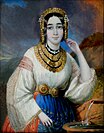Template:Did you know nominations/Marițica Bibescu
Appearance
- The following is an archived discussion of the DYK nomination of the article below. Please do not modify this page. Subsequent comments should be made on the appropriate discussion page (such as this nomination's talk page, the article's talk page or Wikipedia talk:Did you know), unless there is consensus to re-open the discussion at this page. No further edits should be made to this page.
The result was: promoted by Cwmhiraeth (talk) 06:46, 23 February 2018 (UTC)
| DYK toolbox |
|---|
Marițica Bibescu
[edit]- ...
that, when she became Princess-consort of Wallachia in 1845, Marițica Bibescu (pictured) already had five children by two men?Source: Bădescu lists the first four children, born between 1835 and 1842, all fathered by Costache Ghica. Strihan (pp. 70, 71) mentions the fifth child, born out of wedlock to Marițica and Prince Bibescu in 1844.- ALT1:... that the recognition of Marițica Bibescu (pictured) as Princess-consort of Wallachia involved "complicated maneuvers", including the ouster of an Ecumenical Patriarch? Source: Roseti and Teodorescu for "complicated maneuvers". Strihan, p. 70: Maria Ghica, sfătuită tot de domn, la 13 februarie 1845, a introdus cerere scrisă la Mitropolie. Cererea a fost cercetată cu chemarea soțului și respinsă. [...] Maria Ghica, sprijinită de Bibescu, a apelat la patriarhul Constantinopolului, care, în ierarhia bisericească, era superiorul mitropolitului. [...] Încercările lui Bibescu pe lîngă patriarh n-au dat rezultate. [...] Atunci nemaiputând da înapoi Bibescu a recurs la mijlocul extrem. Prin bani (desigur mulți) a reușit să obțină de la Divanul otoman înlocuirea patriarhului cu un altul, mai 'mlădios'. Acesta a admis divorțul [...]. Translates as: "Maria Ghica [i. e. the future Marițica Bibescu], again acting on the Prince's counsel, registered a written request with the Metropolitan on 13 February 1845. Her request was evaluated, and her husband was called in, then rejected. [...] Maria Ghica, backed by Bibescu, appealed to the Patriarch of Constantinople, who was the Metropolitan's superior in the church hierarchy. [...] Bibescu's efforts with the Patriarch were fruitless. [...] And so, being in no position to backtrack, Bibescu embraced extreme methods. With (surely lots of) cash, he managed to obtain from the Ottoman Divan that they replace the Patriarch with another, more 'supple' one. The latter ruled in favor of [her] divorce [...]."
- Reviewed: Regional council of Auvergne-Rhône-Alpes
Created by Dahn (talk). Self-nominated at 08:36, 29 January 2018 (UTC).
 The article is new enough and long enough and within policy. The hooks are both good and the references are fair. I have a slight issue with the first hook. I've struck it, accepting ALT1. In particular regarding the first hook, I'm not totally comfortable using different sources to count the number of children she had. The article seems fine on the point. For the second hook, the translation provided (which looks to check out), uses the words, "extreme measures" while the hook says, "complicated maneuvers". I think "complicated maneuvers" is similar enough to "extreme measures" to be within the prerogative of the translator. Smmurphy(Talk) 17:15, 30 January 2018 (UTC)
The article is new enough and long enough and within policy. The hooks are both good and the references are fair. I have a slight issue with the first hook. I've struck it, accepting ALT1. In particular regarding the first hook, I'm not totally comfortable using different sources to count the number of children she had. The article seems fine on the point. For the second hook, the translation provided (which looks to check out), uses the words, "extreme measures" while the hook says, "complicated maneuvers". I think "complicated maneuvers" is similar enough to "extreme measures" to be within the prerogative of the translator. Smmurphy(Talk) 17:15, 30 January 2018 (UTC)
- Thank you, I personally accept your objections. Concerning ALT1: as stated there, I used "complicated maneuvers" as summarized in another source; the other one I translated here, and which is the source for the dismissal of the Patriarch, uses "extreme measure". The former appears in the article, the latter does not, and therefore cannot be used in the hook. I can of course include the "extreme measure" quote in the article, if you think that is best, and we can then also use it in the hook. Dahn (talk) 18:53, 30 January 2018 (UTC)

